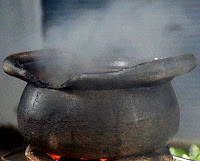Not much to say
Some rare people do it naturally, for the rest of us it is a valuable discovery: when you have nothing to say, just say nothing. You are not obliged to fill all the silences with your words. Allow pause and even better; create stillness when you want to cause other people to speak. This reminds me of a story: Believe it or not, Nasreddin used to be a silent child. As a matter of fact his parents waited for the baby to start speaking and he didn’t. Years passed. The boy was six now and still not talking. Not a word. Mother and Father had tried all they knew to get him speak as other children do. Nothing helped. They even took him to town but the best barbers in Konya didn't find the cause of the ailment. In time, the family accepted, with great sadness, that poor Nasreddin was mute. Then came that God-given afternoon. The child ran into the house shouting, "Mother! Father!! The barn is burning! The barn is all in flames! Come quick!" Happy parents! Who...



